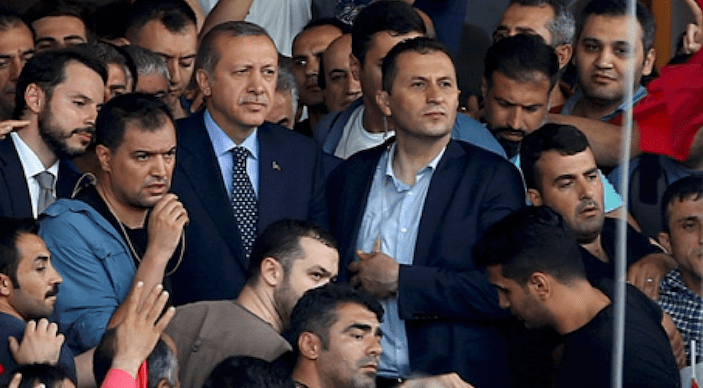(Erdogan surrounded by supporters and guards after landing Istanbul Ataturk Airport in the morning of the coup d’etat)
The previous week, NATO Secretary General Stoltenberg spoke at the press conference after Sweden, Finland and Turkey signed the tripartite memorandum and used the following sentences:
“I think the best way of winning minds and hearts is to continue to do exactly what we do, stand together in addressing all the different security threats we face both a more aggressive Russia, but also, of course, the threat of terrorism which is something which is high on the NATO agenda. “
And unexpectedly, Turkish media outlets from different backgrounds simultaneously misheard Stoltenberg’s pronunciation of “threat of terrorism” as “FETO terrorism”, breaking the news as: NATO now also designates the Gülenists as “FETO” as Turkey names it. . This misunderstanding shows how the subconscious mind is influential on the political mindset in Turkey. So, how did Turkey go through to understand Stoltenberg this wrong? For that, we have to rewind the tape to 2016, that hot July evening.
——————
Till the afternoon of 15th July, 2016, Erdogan’s approval rate was 42 percent, according to Turkey’s prominent poll company, MetroPoll. On the same day a year prior, the AKP was experiencing one of its weakest moments and did not even have a majority government. In the summer of 2015, AKP’s votes had decreased to 40 percent in the June elections, and the opposition for the ruling coalition reached its strongest position in the last twenty years, having an unprecedented psychological advantage.
Despite having deep cleavages with Erdogan, the movement led by Fethulah Gulen was still strong. Countless publications, Gulenist journalists speaking to the mainstream media… They could easily criticize, (some even threaten) Erdogan and support the Gulenist police chiefs and their prior operations. More, the media landscape in Turkey consisted mostly of dissident writers and publications.
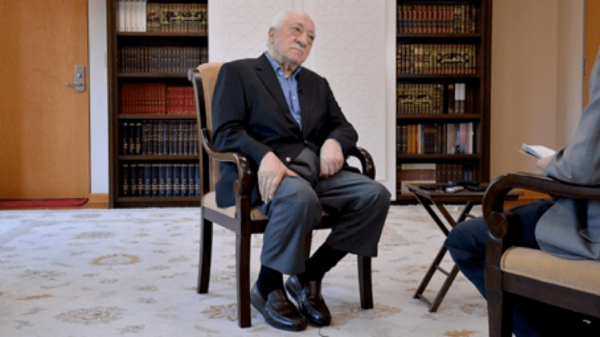
But one night changed everything, and everything. At 9 pm in July 15th, a very unpreferable time for a putschist to declare martial law, the military units descended into the streets, killing 251 people, mostly unarmed civilians, and injuring thousands by shooting streets with helicopters, crashing crowds with tanks. The National Assembly was bombed on live TV. F-16s also bombarded critical spots in central Istanbul and Ankara, flying at low altitudes to create sonic-boom sounds. It was a traumatic night that was not going to be forgotten for many years.
Erdogan has won a lot of things at the end of that night, but lost one of his critical deputies: AKP’s PR Manager Erol Olçok, was among the 17 people who were shot in the Bosphorus Bridge by the soldiers. His death meant a lot of change for AKP’s advertisement and public relations policy in the elections, entailing a more aggressive and negative attitude.
Turkey’s axis, preferences, bureaucracy and finally its regime have changed in one night.
Although Erdoğan and AKP deputies have been narrating it opulently in the last 6 years, what actually happened on the night of July 15th was never freely discussed. Even today, there is no concrete information on what the members of the junta were planning to do, or who they were trying to put on the top after overthrowing Erdogan; but theories and question marks abound.
Were Gulenist officials really behind the coup, or was it Erdogan/AKP?
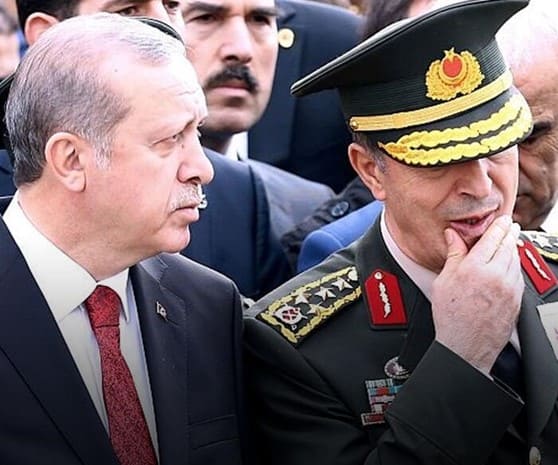
As a researcher who has been following stories around Gulen Movement, one can say this: That Erdoğan started a witch hunt against Gülenists, portrayed them as scapegoats and ruined the lives of innocents does not change the fact that a network of the Gülenists were behind the coup attempt. The Gülenists conducted an extraordinarily secret campaign to place their own people in all state institutions. This campaign was accompanied by false-flag operations and reputation assassinations against anti-Gulenist writers and figures.
Let’s take a look at the reports about the Gulen Movement by US officials on Wikileaks in the pre-coup period:
US Ankara Ambassador Eric Edelman (2005):
“ The Gulen cemaat has concentrated (with marked success) on building up a worldwide network of schools and Turkey-wide network of business and journalists/writers associations. It has also infiltrated hundreds of adherents into the national police, judiciary, and Sayistay (GAO equivalent) and also has made inroads into the AKP government, but more recently has signaled its dissatisfaction with the way Erdogan has tried to govern and appears to be distancing itself from him.”
Istanbul Consul General Sharon A. Wiener (2009):
“Another group that sparks the ire of the Kemalists are the followers of the religious leader Fethullah Gulen. Our contacts all agree they are everywhere in Turkish society, including the strongest bastion of Kemalism — the military.”
US Ambassador to Ankara James Jeffrey (2009):
“The assertion that the TNP is controlled by Gulenists is impossible to confirm but we have found no one who disputes it, and we have heard accounts that TNP applicants who stay at Gulenist pensions are provided the answers in advance to the TNP entrance exam.”

US Ambassador to Ankara James Jeffrey (2009):
“Gulenist newspapers champion the Ergenekon investigation and continually surprisingly, contacts close to the the Turkish General Staff stress that the traditional dominance of the Turkish military has been a negative factor in Turkey’s history. Not surprisingly, contacts close to the the Turkish General Staff openly loathe Gulen, and contend that he and his legions of supporters are embarked on a ruthless quest not only to undermine the Turkish military but to transform Turkey into an Islamic republic similar to Iran.”
Jeffrey, who was US ambassador to Turkey in 2008–2010 also said the following in the interview he gave after the coup:
“The Gülenist movement has some infiltration at the least in the military that I am aware of. They of course had extreme infiltration into the police and judiciary earlier. I had seen that when I was in Turkey previously, particularly in the Sledgehammer case, [the National Intelligence Organization head]Hakan Fidan case [and the]corruption cases in 2013. It is very clear that significant segment of the bureaucracy in Turkey were infiltrated in and had their allegiance to a movement, not a state. That of course is absolutely unacceptable and extremely dangerous. And it highly likely that it has led to the [attempted]coup.”
——————————————————————————————–
Both sides of the coin
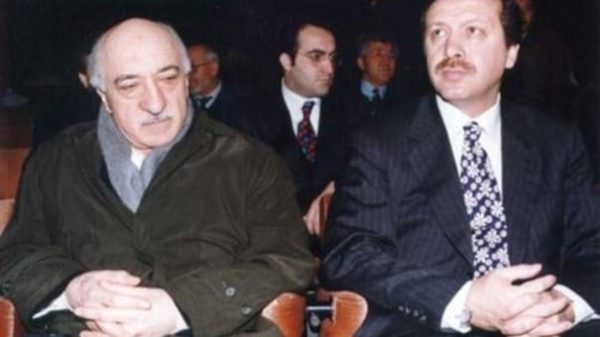
It is very difficult to wrap-up all the material about the night of the coup in one place. The high-ranking soldiers, who were caught and tried after their unsuccessful attempt, and whose contacts with the Gulenist organization hierarchy were revealed, confessed to their guilt. But it is still unclear to whom Gülen gave the order, and how the long-term planning of the coup was sketched. So, in the last two years, exiled Gülenist journalists have been divided among themselves.
The journalists who once made Erdogan sweat at press conferences and were tried for terrorism in Turkey, have now begun to investigate their own leaders and the involvement of the Gülen Movement in the coup attempt. The most well-known of these people is Ahmet Dönmez, who lives in Sweden. He spoke to hundreds of witnesses over the course of a year, identified the members who went to the complex where Gülen lived in Pennsylvania and were in contact with the soldiers, and came to the following conclusion:
“The Gulen Movement was gradually dragged into coup attempt”
But by whom?!!!
In his long news series, Ahmet Dönmez wrote that Fethullah Gülen was told by his staff that “Hulusi Akar will lead the coup”. It is worth noting that he writes these reports under a great risk. He follows both the mafia relations within the AKP and the cosmic and criminal relations of the Gülen Movement. He is not liked by anyone on either side anymore.
Judging by the questionable events and the observations of other senior people, the coup night is still a lot more than the public knows.
An ex TNA (Turkish National Army) officer who served until 2016, currently residing in Denmark, answered the questions of Shaffaf. Emphasizing that he did not participate in the coup and keeping his name anonymous, he describes himself as an ex-Gulenist and claims that the Gülenists in the army were deceived by “high-level figures who were thought not to be loyal to Erdoğan”:
“Erdogan was informed by the intelligence that the Gulenists would engage in an uprising. Yet he didn’t find it smart to simply prevent this, he wanted to do catch. But he was not informed when that would happen. So Erdogan was really caught off guard on vacation. But the top names who informed him knew when that would happen. In other words, a kind of new Sisi could have emerged on the scene that night in the history of Turkish politics.”

The military source reminds of a live television broadcast on the night of July 19, 2016, 4 days after the coup attempt, with Erdogan angrily saying “I didn’t know about the coup till 20:30, I heard it from my brother-in-law, I tried to reach Head of Intelligence Hakan Fidan but he didn’t pick up”, implying that Head of Intelligence Hakan Fidan and Chief of General Staff (current Defense Minister) Hulusi Akar failed to inform him!
“If you ask my opinion, both Erdogan and the Gulenist structure would be finished that night and Turkey would wake up to a brand new morning. Those who set this trap are still closest to Erdogan.”
So what did the Chief of Intelligence and Chief of Staff do that day?
At 14.30, A major pilot from the army, who was missioned to take part in the putsch, takes an initiative and goes to the MIT (Intelligence Service) on July 15 in the afternoon and reports the coup attempt before it starts. Hakan Fidan goes to the General Staff and briefs Commander Akar. He stays with the Chief of General Staff until 20.30, but as if the danger was not percepted, the Head of Intelligence goes on his ordinary meetings and hosts a Syrian opposition commander at the MIT headquarters. However, at that time, the tanks were coming out, advancing towards the Bosphorus Bridge and the MIT was “not aware” of this yet. It is still a mystery that how the government caught off-guarded against a putsch that was reported 6 hours before.
The same mystery goes on when we look outside. Here are the anectodes regarding countries reacted to that night.
Britain: “How is your army been doing these days?”
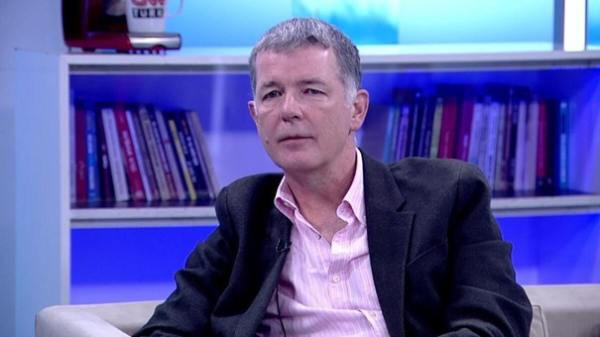
Richard Moore (current MI6 Director, then Ankara Ambassador of United Kingdom)
Britain is one of the countries whose officials have admitted that Gülenists were behind the coup since the first days. Prominent journalist Murat Yetkin accounts an interesting anecdote he had on July 15:
“There was a crowded reception at the British Consulate General in Istanbul on the evening of 15 July 2016. Richard Moore (current MI6 Director, then Ankara Ambassador) had come from Ankara to attend the reception. I was asking—somewhat sarcastic—questions about Boris Johnson, who was then newly appointed Secretary of State, and he wanted to change the subject. All of a sudden, he said, “What is the army doing these days?” So I asked him if he had heard something or he said, “No, I just asked.” The conversation ended there. The reception was over, I went home, but after a while, the coup has started.”
Russia: A mysterious visit by Putin’s shadow advisor on the coup day
Exclusive Photo: Dugin pays a visit to Abdulhakeem Arvasi’s grave just a day before the coup, a muslim reverand who laterly idolized by extreme islamic groups in Turkey (14.07.2016)
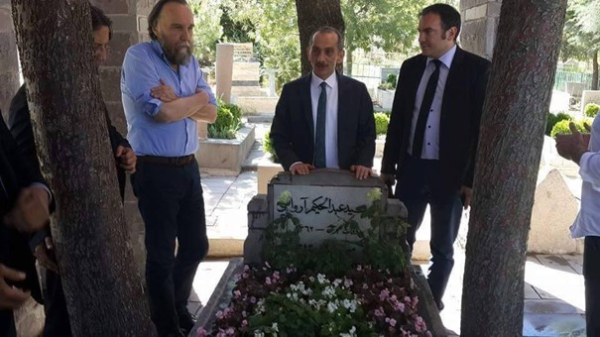
Aleksandr Dugin, Putin’s special adviser, is one of the closest names to pro-Russian parties and figures in Turkey. And what a coincidence, he was in Turkey on July 15 and flew back to Russia an hour before the coup. Dugin met people affiliated with the extreme religious armed group IBDA-C (‘Islamic Great Eastern Raiders Front) on July 14, and visited the grave of Abdulhakeem Arvasi, the idol of the organization’s leader, Salih Mirzabeyoğlu. Then he met with a low-level Turkish bureaucrat. Why did he visit that grave and for what reason he met these people is still not clear. However, Dugin after the coup, somehow began to be hosted by mainstream TV channels in Turkey, claimed that Russia had warned Erdogan about the coup a day before and at that night a group of academics and philantrophists like Henri Barkey, Osman Kavala were orchestrating the coup from Prince Islands.
Shift from Western Axis and the purges
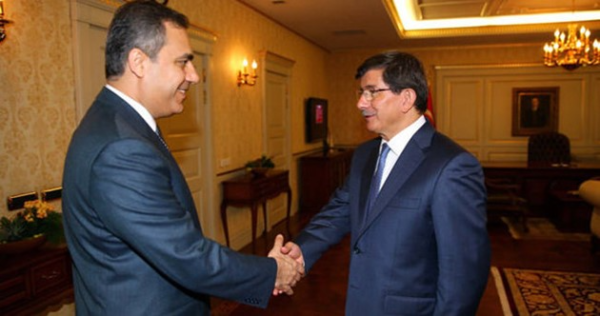
If the majority of Erdogan’s circle today consists of anti-Western figures, it was thanks to the purges and axis change in 2016. Prime Minister Davutoğlu (2014-2016), who brought Turkey one step closer to the visa agreement with the EU and started a transparency operation within the AKP after Tayyip Erdoğan was elected President, had to resign just 2 months prior to the coup, following the campaign of the anti-western propogandist Pelican group led by Minister of Economy Berat Albayrak (the President’s son-in-law). The purge against Davutoğlu and his deputies from the state administration resulted in the voices of bureaucrats and politicians close to the West being heard less. The coup attempt on July 15, on the other hand, caused the rewriting of all theses and theories in Turkey, and the complete loss of trust in Western countries in the eyes of the public. Russia has become a more reliable country than the United States. The ambivalent attitude of the USA on the night of the coup may have played a large role in this outcome. But judging by the statements made by the Kremlin that night, Russia actually showed the same ambivalent attitude, until it was clear that Erdogan had won.
Today is a national holiday in Turkey. Tens of squares, hundreds of avenues and number of bridges named after 15th of July. At least 200.000 people were either fired due to Gulenist ties or faced charges of terrorism. Some of the top officials who averted the coup step by step purged from state institutions. The best example for that is the unexpected retirement of commanders Ismail Temel and Zekai Aksakallı, figures who were seen as the most critical actors in the military who changed the course of the coup night and also leaded the cross-border operations in Northern Syria in the following months. A prominent Kemalist writer Muyesser Yıldız, harsh Akar critic relates these retirement decisions by general staff of TNA to the commanders’ disagreement they had with the Defence Minister.
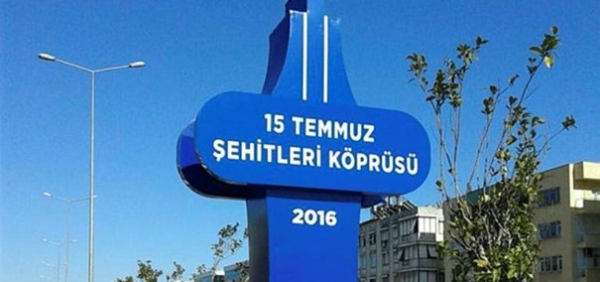
When viewed from the sixth-year anniversary, it is an indisputable fact that Gülenists took part in the coup attempt. But the evidences show they acted as if they were not alone and this was definitely not a full-fledged coup operation. What if everything had gone according to putschists’ plan? No one knows exactly how to answer that yet. No conclusive evidence of this has emerged till date. Contrary to the claims of “leading Turkey an Iran-like regime” made by some, the “Peace at Home Council” junta, which announced on television that it seized power on the night of the coup, declared that it recognizes all international agreements to which Turkey was a party, and reiterated commitment to NATO.
After the 2017 referendum extended the power of Erdogan, it was more clear that a brand new regime and a discourse was built on a doubled-edged tragedy. The AKP’s version of 15 July is the foundation of this political discourse, which keeps the regime astand and legitimate. That is why finding out what exactly happened at that night is as crucial as it is difficult for the prospects of democracy, for the future.

